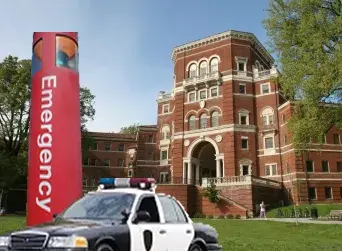Campus security officers are often the first to arrive at the scene when there has been violence or an assault on campus. Entrusted with the safety of students, faculty and staff who live, work and study on campus, these responders are trained to handle emergencies ranging from theft, assault, arson and active shooter situations to pandemic influenza, fires and natural disasters that can endanger hundreds of lives. Campus security and first responders are a vital part of a school’s response to these security incidents.
According to Campus Safety Magazine, every year almost 90 percent of educational institutions reported a safety incident, and 31percent of schools notified parents of a lockdown. Each of these emergencies required immediate action to get people to safety. The U.S. Department of Education Campus Crime Statistics Online provides estimates on the number of safety incidents that occur. In a 2014 Federal Bureau of Investigation study of 160 active shooter incidents in the U.S. between 2000 to 2013, educational environments were identified as the second-largest location grouping with 24.4 percent incidents occurring in schools. Many of these emergencies occur with little to no warning, and it is critical for institutions of higher education (IHEs) to plan ahead to ensure the safety and general welfare of all members of the campus community.
 Many resources are available to help strengthen campus security and plan for emergencies that may arise. The Department of Homeland Security is helping campuses with their campus emergency planning efforts by hosting events such as national tabletop exercises designed specifically for colleges and universities. These events include workshop sessions on topics relevant to campus preparedness and resilience in coping with potential emergency scenarios.
Many resources are available to help strengthen campus security and plan for emergencies that may arise. The Department of Homeland Security is helping campuses with their campus emergency planning efforts by hosting events such as national tabletop exercises designed specifically for colleges and universities. These events include workshop sessions on topics relevant to campus preparedness and resilience in coping with potential emergency scenarios.
Within the Department of Justice, the Office of Community Oriented Policing Services (COPS Office), a component within the Department of Justice, dedicated to the concept of police and communities working together to more effectively address underlining security issues, changing negative patterns and focusing resources. Over the last 20 years, the COPS Office has initiated crime analysis through the funding of community policing officers, resources, training and technical assistance. The COPS Office partners with law enforcement, businesses and other federal agencies to enhance policing activities and outcomes.
The following resources that can assist responders and communities in strengthening campus safety and security:
- The National Summit on Campus Public Safety describes current activities and future needs in the field of campus safety, identifies notable successes in campus safety and security, and how to replicate them. One recommendation suggests that all campus police chiefs and security directors should have access to and meet with college and university presidents and other key decision makers.
- The Department of Education’s Campus Security site provides handbooks with step-by-step procedures, examples and references for higher education institutions to follow in meeting campus safety and security requirements. It provides training and resources to keep students, parents and employees well informed about campus security.
- Ready.gov "Campus Ready" resources provide a whole community focus to campus resiliency. The site offers tools, training and resources to educate, empower and enhance the ability of colleges and universities to prepare for, mitigate, respond to and recover from disasters using an all-hazards approach.
- The Community Emergency Response Team Program educates and trains faculty, staff and students about disaster preparedness for hazards that may impact their area, and trains them in basic disaster response skills, such as fire safety, light search and rescue, team organization and disaster medical operations.
- The Action Guide for Emergency Management at Institutions of Higher Education can help personnel from IHEs and their partners better understand the field of emergency management within a higher education context, develop and implement an institution's emergency management plan, and serve as a reference and resource to improve an institution's existing plans.
- The Federal Communications Commission’s Campus Emergency Information site provides campus emergency communications plans, case studies, lessons learned and guidelines relevant to emergency preparedness and planning for first responders.
